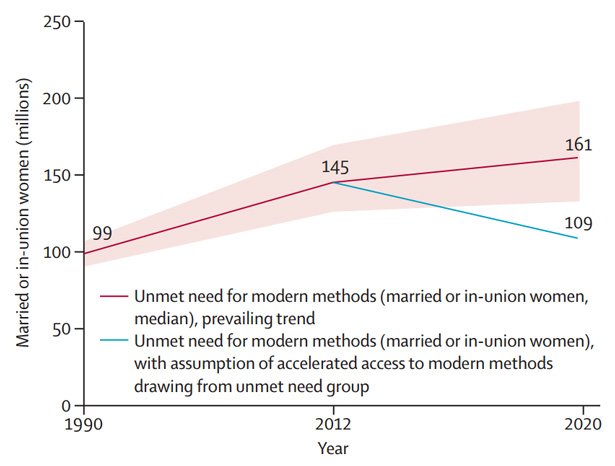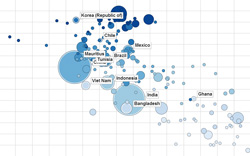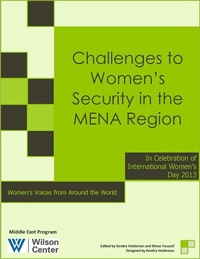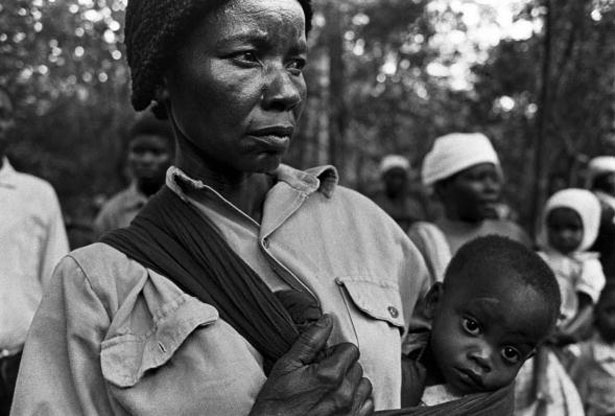-
Making ‘Healthy People, Healthy Environment’: A Look Inside Integrated Development
›“We need dynamic approaches. We can’t just keep going with the single sector approach and hoping that a conservation project will do really more than it’s intended to do,” said ECSP’s Multimedia Editor Sean Peoples in an interview with Dialogue at the Wilson Center. “These people are living integrated lives. How can we have integrated solutions for them?”
-
Carl Gierstorfer, Pulitzer Center on Crisis Reporting
River Erosion a Push Factor for India’s Bride Trafficking
›March 27, 2013 // By Wilson Center Staff
The original version of this article, by Carl Gierstorfer, appeared on the Pulitzer Center on Crisis Reporting.
After spending almost two weeks in India’s northwestern state of Haryana, the destination for many trafficked brides, we decided to head to the source area. It lies two hours by plane to the east, in the lush green hills of Assam. Here, as well as in the surrounding states of West Bengal, Bihar, and Nagaland, many women are trafficked from the towns and villages to live the lives of slaves more than a thousand miles away from their homes.
We wanted to find out why.
-
Kaja Jurczynska, Population Action International
222 Million vs. 233 Million: Measuring Global Unmet Need for Contraception
›March 21, 2013 // By Wilson Center Staff
Last week, a new study out of The Lancet projected that in 2015, 233 million married or in-union women worldwide will have an unmet need for modern family planning.
-
Demographic Dividend and the Rise of the Global South
›
The Global South is “radically reshaping the world of the 21st century, with developing nations driving economic growth, lifting hundreds of millions of people from poverty, and propelling billions more into a new global middle class,” says the United Nations Development Program’s (UNDP) 2013 Human Development Report, released yesterday. “More than 40 developing countries have made greater human development gains in recent decades than would have been predicted.”
-
The Demographic Dividend in Lower-Income Countries and Global Reproductive Rights Laws
› Many of the fastest growing countries in the world today are also the poorest. A recent bulletin from the National Transfer Accounts Project, “Lower Income Countries and the Demographic Dividend,” examines what it takes for lower-income countries to experience a demographic dividend and the economic growth associated with that period. Achieving the demographic dividend is dependent on a country achieving low fertility rates, which, when coming from a period of high growth, temporarily increases the ratio of the working-age population to dependents, like children and the elderly. For lower-income countries to do this, the report recommends that policymakers invest in healthcare and education programs and focus on boosting the labor force participation rate. Looking forward, the report advises that it is not too early for lower-income countries to begin developing social security and pension programs to support the latter stages of the demographic transition too.
Many of the fastest growing countries in the world today are also the poorest. A recent bulletin from the National Transfer Accounts Project, “Lower Income Countries and the Demographic Dividend,” examines what it takes for lower-income countries to experience a demographic dividend and the economic growth associated with that period. Achieving the demographic dividend is dependent on a country achieving low fertility rates, which, when coming from a period of high growth, temporarily increases the ratio of the working-age population to dependents, like children and the elderly. For lower-income countries to do this, the report recommends that policymakers invest in healthcare and education programs and focus on boosting the labor force participation rate. Looking forward, the report advises that it is not too early for lower-income countries to begin developing social security and pension programs to support the latter stages of the demographic transition too. -
After the Arab Spring, Challenges Intensify for Women in the Middle East and North Africa
›
Excerpted below is the introduction, by Haleh Esfandiari, to Challenges to Women’s Security in the MENA Region. The full report is available for download from the Wilson Center’s Middle East Program.
On the occasion of International Women’s Day 2013, the Middle East Program at the Wilson Center invited a cross-section of women activists, politicians, academics, and entrepreneurs to give us their views on the challenges women face to their security. This publication, “Challenges to Women’s Security in the MENA Region,” includes pieces from 42 women from 20 countries, including the United States, Malaysia, Indonesia, and countries in the Middle East and North Africa (MENA) shared with us their concerns, disappointments, and hopes for women in the region.
-
International Women’s Day: Violence Pervasive, With Wide-Ranging Effects
›March 8, 2013 // By Kate Diamond
The theme of this year’s International Women’s Day is “a promise is a promise: time for action to end violence against women.” The theme reflects that although there are a number of treaties and conventions that on paper promise to protect women’s rights, equality, and security, in reality, those promises to protect human rights have been broken time and again.
-
Rebecca Fishman, WASH Advocates
New Water and Women’s Health Series by MHTF and WASH Advocates
›
The original version of this article, by Rebecca Fishman, appeared on the WASH Advocates and Maternal Health Task Force blogs.
Access to clean water is not only one of the world’s most urgent health issues, but it is also a key to boosting progress in developing countries. Women and children are disproportionately affected by inadequate water, sanitation, and hygiene (WASH), and they shoulder the largest burden in collecting drinking water. What is more, when the needs of women and girls are not taken into account, the effects are felt far and wide, reaching across the education, health, security, and economic sectors. On the other hand, improving WASH can have positive impacts throughout a girl’s life and can even extend across generations. As we know, when women thrive, so do their communities.
Showing posts from category gender.










